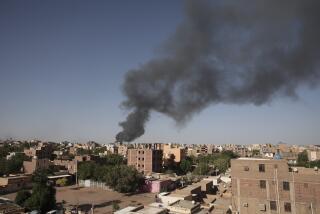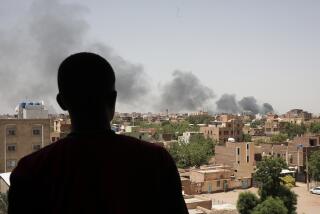Top General Salutes GIs in Somalia : Africa: Shalikashvili in farewell trip as troops depart. Security is tight in capital.
- Share via
MOGADISHU, Somalia — As lawlessness in the streets of the Somali capital continued to spiral out of control Saturday, Gen. John M. Shalikashvili, chairman of the U.S. Joint Chiefs of Staff, arrived at Mogadishu’s heavily guarded airport for a tense, 22-hour visit.
His aim was to congratulate the last of America’s departing troops and consult with the U.N. commanders the United States is leaving behind.
But before landing at a seaside airport blanketed by U.S. Marine artillery batteries, sniper positions and hundreds of ground troops, Shalikashvili told reporters that he is “very concerned” about security in the anarchic nation after the last American soldier leaves March 25.
On a day of abductions, hijackings and a stabbing directed at U.N. personnel and their contractors in Mogadishu, U.S. commanders on the ground already were taking no chances.
Moments after he landed, the general was whisked from the tarmac in an armored convoy to a fleet of armed helicopters, which took him to the headquarters of the Egyptian and Pakistani U.N. peacekeeping contingents located less than a mile away.
The chairman spent Saturday night at the airport, one of the last high-security compounds left in the city that more than 20,000 U.S. Marines secured for the first time Dec. 9, 1992, after two years of civil war. Until his scheduled departure at 1 p.m. today, Shalikashvili was to remain either at the airport or aboard one of the dozen U.S. warships just offshore, where he planned to thank the troops for what he earlier had called “a great victory . . . that is celebrated in our hearts.”
“The victory is in the thousands of children, men and women--Somalis--who are alive today,” he told reporters, referring to the initial U.S. military intervention that saved hundreds of thousands of Somalis from a war-induced famine that had claimed 300,000 lives.
Just outside the airport walls, though, it was clear that the U.S. military had met with somewhat less success during the second phase of its objective here--to provide the logistic, military and strategic backbone of a U.N. mission to pacify and rebuild the ruined nation.
In a city still without a government, power or even the most basic municipal services, Somali gunmen Saturday apparently abducted a New Zealander and a Kenyan from a truck owned by the United Nations’ Australian catering company, a U.N. spokesman confirmed.
In a separate incident, gunmen hijacked a truck owned by an American logistics contractor, the Texas-based Brown & Root. And elsewhere in town, a U.N. officer was stabbed on the street near a U.N. residence.
U.N. spokesman George Bennet said he would not use the word kidnaping to describe the disappearance of the two employees of Morris Catering, which has the exclusive contract to feed the more than 20,000 U.N. soldiers and civilians in the country.
“The details of this incident are still sketchy and obscure,” he said. But he confirmed that the Morris employees were taken away at gunpoint just after noon and that they have been missing ever since. It was the second serious attack on the Australian catering firm. The owner’s son, Tyson Morris, was shot to death gangland style last October in a dispute over hiring practices.
Pakistani Brig. Gen. Saulat Abbas, commander of the largest armed contingent the United States will leave behind, planned to brief Shalikashvili about the escalating lawlessness when they dined together at the Pakistani camp Saturday night.
Such concerns were echoed by U.S. Maj. Gen. Thomas Montgomery, the departing commander of the thousands of U.S. forces that served under the United Nations since it took command of the mission last May.
Although he expressed “guarded optimism” about continuing U.N. efforts to bring together Somalia’s warring clans and their armed militias into some form of government, Montgomery indicated in an interview with The Times last week that he, too, expects security to deteriorate rapidly.
Yet Montgomery stressed that all U.S. troops who served in Somalia during a 15-month intervention in which 30 American servicemen have been killed and 175 injured in attacks by clan militiamen are, in fact, heroes.
“They never flinched, and they have been the backbone of this operation here,” Montgomery said of his troops. “No matter how America feels about Somalia or the United Nations, they really need to feel good about the professionalism, the dedication and the valor of the American servicemen and servicewomen who served here.
“There’s no Vietnam here, and there has been far more fighting over an extended time here than in Desert Shield and Desert Storm. I don’t think anybody back there (in the United States) thinks these Americans did not perform at the best of their ability.”
More to Read
Sign up for Essential California
The most important California stories and recommendations in your inbox every morning.
You may occasionally receive promotional content from the Los Angeles Times.












